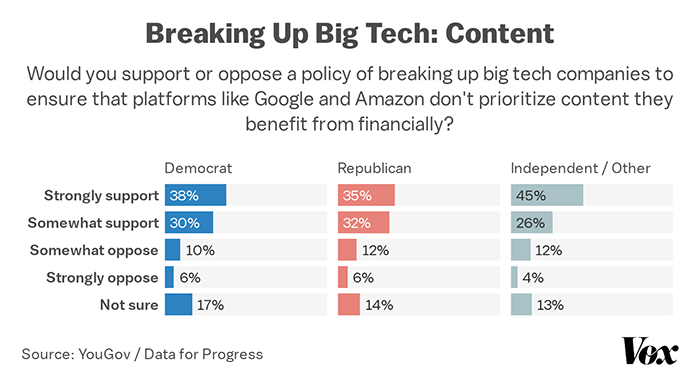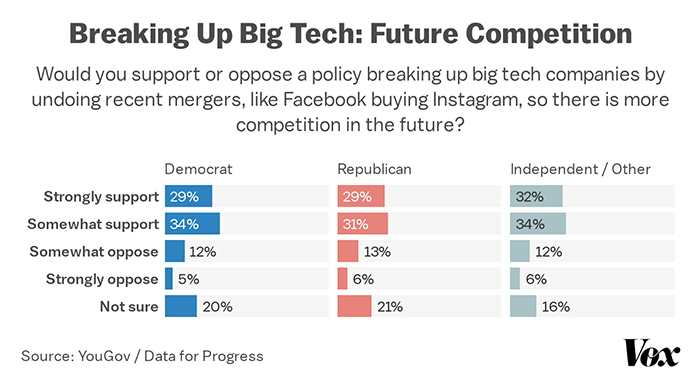SHARE
Good-bye Big Tech?
Privacy. Tax loopholes. Monopolies. Hacking. Fake news.
What do they all have in common? Big Tech and its influence on current consumer mindsets, the economy and state of the media.
The big question here is—do Americans care enough to do something to take away that influence? The short answer is yes. Nearly 7 in 10 Americans say it’s time to break up the mega companies like Amazon, Facebook, Apple and Google. That sentiment carries across party lines.
U.S. politicians are paying attention to the topic. It’s not often that we see parties closely aligned, but when it comes to Big Tech, they’re in agreement. The shared stance on Big Tech was evident after Facebook’s $1 billion purchase of Instagram in 2012. When it came to overturning the merger, 63% of Democrats, 60% of Republicans and 66% of Independents were in favor.
The Politics of Big Tech
After what happened in the 2016 election, it’s no surprise Democratic presidential candidates have Big Tech at the forefront of their minds. U.S. Senator and 2020 presidential candidate Elizabeth Warren has likely taken the boldest stance, repeatedly calling for the breakup of Amazon and Google among others—and she has a plan for that.
Giant tech companies have too much power. My plan to #BreakUpBigTech prevents corporations like Amazon from knocking out the rest of the competition. You can be an umpire, or you can be a player—but you can’t be both. #WarrenTownHall pic.twitter.com/73y1002QVv
— Elizabeth Warren (@ewarren) April 23, 2019
Even the Trump administration, keen on self-regulation in the business sector, has opened investigations from the Justice Department and the FTC into the likes of Apple, Google and Amazon. Resolutions to the investigations are expected sometime in 2020.
It’s Not You, It’s Me
Even though voters seem ready to see something done about these companies, it’s becoming clear that a breakup isn’t simple, and we need new ways to regulate new technologies. Antitrust laws like the Clayton Antitrust Act and the Sherman Act were originally created to keep big companies from hurting lesser competition. But they did nothing to address digital sales platforms, and didn’t account for the speed of tech and the benefit that comes from combining data and technology via acquisitions.
If we look at the example of when Facebook bought Instagram, it lessened competition in a narrow sense: a smartphone app generating ad dollars via user-generated content bought a competitor. But, when Instagram was bought, it had only 30 million users and a dozen employees. It sold for a billion dollars and now has a billion users. So, would one even say it lessened competition? Perhaps it helped Instagram flourish.
What’s needed is a new set of regulations for a new time. A way to keep things competitive without stifling innovation that moves at an exponential rate. And even though Big Tech is the primary target, the Telecom and Financial industries aren’t far behind. The more they combine forces and infuse technology into their business models, the more they fall into the same category as Silicon Valley.
Can We Still be Friends?
Things are changing. In 2019 alone, 15 million users left Facebook. Is that just the beginning? Should we just break up now?
Facebook’s CEO and Google’s former CEO both take the position that if you break up Big Tech, it will hurt America and help China. They argue that China’s tech know-how will escalate a U.S.—China trade war. So, in their opinion, what’s good for Big Tech is good for America. It’s good for CEOs’ pay packages. But it gets trickier when the trickle down doesn’t happen fast enough.
Voters not only decide what’s next by voting politicians into office, but also by which social media and tech platforms they choose to use—and their wallets. Alexa…I’m not sure I see us being together forever.
References
1. https://www.reuters.com/article/us-usa-election-tech-factbox/where-us-presidential-candidates-stand-on-breaking-up-big-tech-idUSKBN1ZN16C
2. https://www.vox.com/policy-and-politics/2019/9/18/20870938/break-up-big-tech-google-facebook-amazon-poll
3. https://www.vox.com/recode/2019/5/3/18520703/big-tech-break-up-explained
4. https://www.marketwatch.com/story/regulating-big-tech-was-mostly-talk-in-2019-expect-the-same-in-2020-2019-12-27
5. https://www.marketplace.org/2019/03/06/exclusive-look-numbers-showing-users-leaving-facebook-by-the-millions/
6. https://www.wired.com/story/big-tech-breaking-will-only-help-china/
7. https://blog.hootsuite.com/instagram-statistics/


Good-bye Big Tech?
SHARE
Privacy. Tax loopholes. Monopolies. Hacking. Fake news.
What do they all have in common? Big Tech and its influence on current consumer mindsets, the economy and state of the media.
The big question here is—do Americans care enough to do something to take away that influence? The short answer is yes. Nearly 7 in 10 Americans say it’s time to break up the mega companies like Amazon, Facebook, Apple and Google. That sentiment carries across party lines.
U.S. politicians are paying attention to the topic. It’s not often that we see parties closely aligned, but when it comes to Big Tech, they’re in agreement. The shared stance on Big Tech was evident after Facebook’s $1 billion purchase of Instagram in 2012. When it came to overturning the merger, 63% of Democrats, 60% of Republicans and 66% of Independents were in favor.
The Politics of Big Tech
After what happened in the 2016 election, it’s no surprise Democratic presidential candidates have Big Tech at the forefront of their minds. U.S. Senator and 2020 presidential candidate Elizabeth Warren has likely taken the boldest stance, repeatedly calling for the breakup of Amazon and Google among others—and she has a plan for that.
Giant tech companies have too much power. My plan to #BreakUpBigTech prevents corporations like Amazon from knocking out the rest of the competition. You can be an umpire, or you can be a player—but you can’t be both. #WarrenTownHall pic.twitter.com/73y1002QVv
— Elizabeth Warren (@ewarren) April 23, 2019
Even the Trump administration, keen on self-regulation in the business sector, has opened investigations from the Justice Department and the FTC into the likes of Apple, Google and Amazon. Resolutions to the investigations are expected sometime in 2020.
It’s Not You, It’s Me
Even though voters seem ready to see something done about these companies, it’s becoming clear that a breakup isn’t simple, and we need new ways to regulate new technologies. Antitrust laws like the Clayton Antitrust Act and the Sherman Act were originally created to keep big companies from hurting lesser competition. But they did nothing to address digital sales platforms, and didn’t account for the speed of tech and the benefit that comes from combining data and technology via acquisitions.
If we look at the example of when Facebook bought Instagram, it lessened competition in a narrow sense: a smartphone app generating ad dollars via user-generated content bought a competitor. But, when Instagram was bought, it had only 30 million users and a dozen employees. It sold for a billion dollars and now has a billion users. So, would one even say it lessened competition? Perhaps it helped Instagram flourish.
What’s needed is a new set of regulations for a new time. A way to keep things competitive without stifling innovation that moves at an exponential rate. And even though Big Tech is the primary target, the Telecom and Financial industries aren’t far behind. The more they combine forces and infuse technology into their business models, the more they fall into the same category as Silicon Valley.
Can We Still be Friends?
Things are changing. In 2019 alone, 15 million users left Facebook. Is that just the beginning? Should we just break up now?
Facebook’s CEO and Google’s former CEO both take the position that if you break up Big Tech, it will hurt America and help China. They argue that China’s tech know-how will escalate a U.S.—China trade war. So, in their opinion, what’s good for Big Tech is good for America. It’s good for CEOs’ pay packages. But it gets trickier when the trickle down doesn’t happen fast enough.
Voters not only decide what’s next by voting politicians into office, but also by which social media and tech platforms they choose to use—and their wallets. Alexa…I’m not sure I see us being together forever.
References
1. https://www.reuters.com/article/us-usa-election-tech-factbox/where-us-presidential-candidates-stand-on-breaking-up-big-tech-idUSKBN1ZN16C
2. https://www.vox.com/policy-and-politics/2019/9/18/20870938/break-up-big-tech-google-facebook-amazon-poll
3. https://www.vox.com/recode/2019/5/3/18520703/big-tech-break-up-explained
4. https://www.marketwatch.com/story/regulating-big-tech-was-mostly-talk-in-2019-expect-the-same-in-2020-2019-12-27
5. https://www.marketplace.org/2019/03/06/exclusive-look-numbers-showing-users-leaving-facebook-by-the-millions/
6. https://www.wired.com/story/big-tech-breaking-will-only-help-china/
7. https://blog.hootsuite.com/instagram-statistics/


Good-bye Big Tech?
SHARE
Privacy. Tax loopholes. Monopolies. Hacking. Fake news.
What do they all have in common? Big Tech and its influence on current consumer mindsets, the economy and state of the media.
The big question here is—do Americans care enough to do something to take away that influence? The short answer is yes. Nearly 7 in 10 Americans say it’s time to break up the mega companies like Amazon, Facebook, Apple and Google. That sentiment carries across party lines.
U.S. politicians are paying attention to the topic. It’s not often that we see parties closely aligned, but when it comes to Big Tech, they’re in agreement. The shared stance on Big Tech was evident after Facebook’s $1 billion purchase of Instagram in 2012. When it came to overturning the merger, 63% of Democrats, 60% of Republicans and 66% of Independents were in favor.
The Politics of Big Tech
After what happened in the 2016 election, it’s no surprise Democratic presidential candidates have Big Tech at the forefront of their minds. U.S. Senator and 2020 presidential candidate Elizabeth Warren has likely taken the boldest stance, repeatedly calling for the breakup of Amazon and Google among others—and she has a plan for that.
Giant tech companies have too much power. My plan to #BreakUpBigTech prevents corporations like Amazon from knocking out the rest of the competition. You can be an umpire, or you can be a player—but you can’t be both. #WarrenTownHall pic.twitter.com/73y1002QVv
— Elizabeth Warren (@ewarren) April 23, 2019
Even the Trump administration, keen on self-regulation in the business sector, has opened investigations from the Justice Department and the FTC into the likes of Apple, Google and Amazon. Resolutions to the investigations are expected sometime in 2020.
It’s Not You, It’s Me
Even though voters seem ready to see something done about these companies, it’s becoming clear that a breakup isn’t simple, and we need new ways to regulate new technologies. Antitrust laws like the Clayton Antitrust Act and the Sherman Act were originally created to keep big companies from hurting lesser competition. But they did nothing to address digital sales platforms, and didn’t account for the speed of tech and the benefit that comes from combining data and technology via acquisitions.
If we look at the example of when Facebook bought Instagram, it lessened competition in a narrow sense: a smartphone app generating ad dollars via user-generated content bought a competitor. But, when Instagram was bought, it had only 30 million users and a dozen employees. It sold for a billion dollars and now has a billion users. So, would one even say it lessened competition? Perhaps it helped Instagram flourish.
What’s needed is a new set of regulations for a new time. A way to keep things competitive without stifling innovation that moves at an exponential rate. And even though Big Tech is the primary target, the Telecom and Financial industries aren’t far behind. The more they combine forces and infuse technology into their business models, the more they fall into the same category as Silicon Valley.
Can We Still be Friends?
Things are changing. In 2019 alone, 15 million users left Facebook. Is that just the beginning? Should we just break up now?
Facebook’s CEO and Google’s former CEO both take the position that if you break up Big Tech, it will hurt America and help China. They argue that China’s tech know-how will escalate a U.S.—China trade war. So, in their opinion, what’s good for Big Tech is good for America. It’s good for CEOs’ pay packages. But it gets trickier when the trickle down doesn’t happen fast enough.
Voters not only decide what’s next by voting politicians into office, but also by which social media and tech platforms they choose to use—and their wallets. Alexa…I’m not sure I see us being together forever.
References
1. https://www.reuters.com/article/us-usa-election-tech-factbox/where-us-presidential-candidates-stand-on-breaking-up-big-tech-idUSKBN1ZN16C
2. https://www.vox.com/policy-and-politics/2019/9/18/20870938/break-up-big-tech-google-facebook-amazon-poll
3. https://www.vox.com/recode/2019/5/3/18520703/big-tech-break-up-explained
4. https://www.marketwatch.com/story/regulating-big-tech-was-mostly-talk-in-2019-expect-the-same-in-2020-2019-12-27
5. https://www.marketplace.org/2019/03/06/exclusive-look-numbers-showing-users-leaving-facebook-by-the-millions/
6. https://www.wired.com/story/big-tech-breaking-will-only-help-china/
7. https://blog.hootsuite.com/instagram-statistics/


